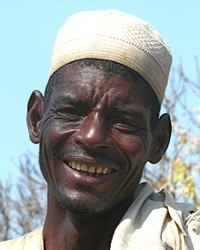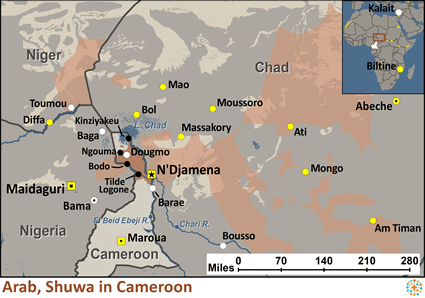The Shuwa Arab name, "Baggara" comes from the Arabic word bagar meaning cow - an appropriate name because these semi-nomadic, agricultural people of Cameroon depend on cattle for their food and economy. The Shuwa Arabs of Cameroon live in the "hinge" between West and Central Africa on the northern savanna near Fort-Foureau. This area straddles the borders of Chad and Nigeria and the Shuwa Arabs frequently cross into these countries to visit or live with kin. Historically, they migrated all through the north central areas of Africa as raiders and cattle and slave traders.
Cameroon's ethnic diversity and many languages and dialects are legacies left by the long line of nomadic peoples who have passed through the country. Because so many of Cameroon's tribes live a semi-nomadic lifestyle, the Cameroon government has met with little success in its quest for national unity.
The Shuwa Arabs generally move their herds two times a year. During the dry season (October to April), the herds are moved south to the river lands. When the rains come, the herds are moved north to the grasslands.
Shuwa Arab towns are composed of small compounds grouped according to male family and tribal lines. Shuwa Arabs men frequently have one wife who may live in the nomadic camp and another who lives in the village or town. Shuwa Arabs women build the mud brick and thatched roof houses plus any other structures connected with the house. Men build the sun shelters they use for eating and entertaining while tending cattle.
The roles of men and women are strictly separated. Women are responsible for all of the household work and are the primary caretakers of the children. They also milk the cows, which not only provides the family with dairy products, but by selling the products women earn extra income which they control.
Men manage and market the cattle; they also plant and harvest crops of millet, yams, plantains and cassava melons. Boys herd calves and small stock. All children attend school, although girls usually withdraw after about six years.
Shuwa Arabs dress symbolizes a person's importance. Most men wear a large cotton garment called a boubou. Prominent men wear either white or blue turbans, with the size of the turban indicating the importance of the man. Men usually strap a dagger to their upper arms; they also wear small, rectangular leather cases around their necks or strapped to their belts and arms. These cases contain verses from the holy Koran.
Married women wear veils covering their shoulders and upper bodies, plus head kerchiefs wrapped like turbans. The women wear numerous anklets, bracelets, and necklaces as well as a series of earrings outlining the entire earlobe.
Shuwa Arabs in Cameroon are passive Sunni Muslims who observe the "five pillars of faith" (declare the faith of Islam, say daily prayers, give alms, fast, and make the pilgrimage to Mecca).
Almost any occasion-the arrival of a visitor, unexpected good fortune, or someone returning from a trip-is an excuse for a communal feast. Betrothal, marriage, and moving the newlyweds to their new residence calls for a major celebration. It also offers the young people an opportunity for courting. The death of a close relative requires a forty-day mourning period, which is followed by a feast.
Christianity is considered the major religion in Cameroon and the second largest religion is Islam. However, the Shuwa Arabs of Cameroon are Muslims, and there are no known Christians among them at this time. The New Testament, the JESUS Film, and Christian radio broadcasts are all available in the Badawi language.
Pray for the effectiveness of the JESUS Film among Shuwa Arabs.
Ask the Holy Spirit to anoint the Gospel as it goes forth via radio to the Shuwa Arabs.
Pray that God will raise up prayer teams who will begin breaking up the soil through worship and intercession.
Scripture Prayers for the Baggara, Shuwa Arab in Cameroon.
| Profile Source: Joshua Project |


























